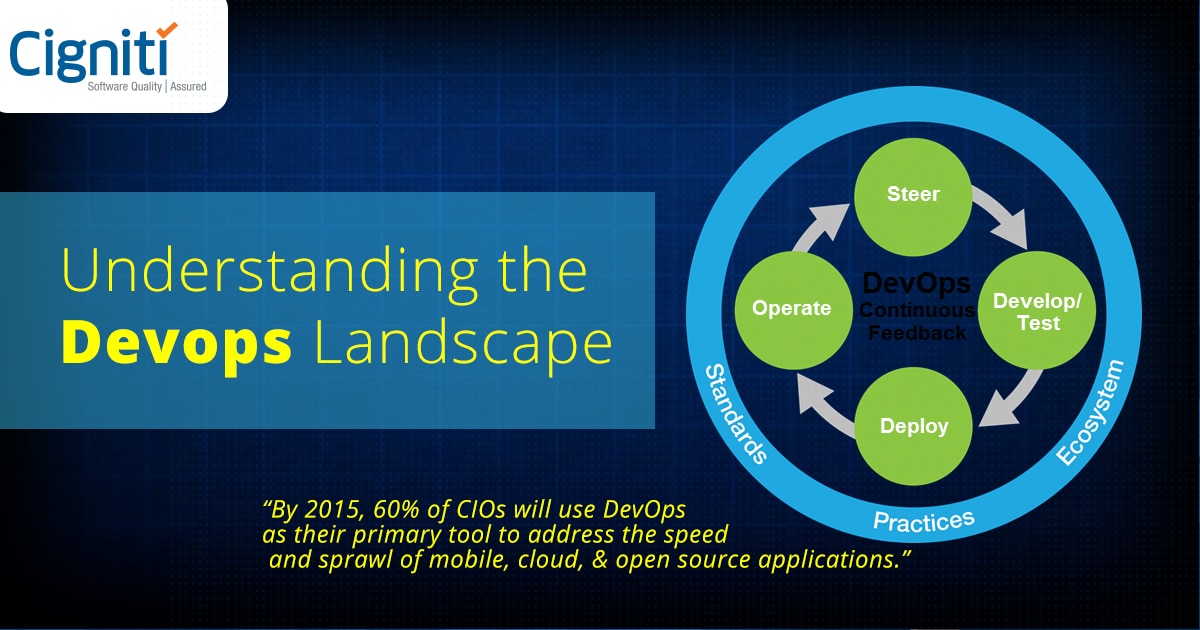Modernize your Apps with Speed and Control using a DevOps Approach
|
Listen on the go!
|
With smartphones becoming the primary device platform to access the internet across the world, the fascination of people in using mobile applications has grown significantly.
Statistically speaking, businesses expect customers to spend more than $156 billion on products or services using mobile apps.
According to a statistic published on decibel.com, “The mobile app downloads in 2021 are expected to touch a staggering 258 billion, an increase of 45 percent since 2017. With the increased usage of mobile apps, the industry is now expecting to generate over $156 billion in consumer app spend by 2022.”
This shift of people towards the use of mobile apps has prompted businesses to develop mobile applications in greater numbers to deliver products and/or services.
Initially, businesses were focused on creating a demand for their apps in the market and had taken recourse to the “more the merrier” approach.
However, soon they discovered that apps could go up the popularity charts only if they deliver speed, usability, quality, security, and performance.
So, it ultimately boiled down to modernizing app development to reduce costs, strengthen security, enable maintainability, and improve code quality.
And following the DevOps approach is arguably the best bet for businesses to meet their objectives.
Why DevOps for mobile app development
As a software engineering approach, DevOps combines Development and Operations and envisages a seamless collaboration among various stakeholders.
These include project managers, developers, testers, and members of the operations team.
With DevOps implementation, a roadmap is laid for every stakeholder or department with the proper demarcation of responsibilities.
In other words, everyone gets clear visibility of the business goals and works in close coordination with others.
According to Markets and Markets, “The DevOps market size is expected to grow from USD 2.90 Billion in 2017 to USD 10.31 Billion by 2023, at a Compound Annual Growth Rate (CAGR) of 24.7% during the forecast period. The demand for DevOps solutions and services among enterprises is expected to gain huge traction, due to the increasing need for fast application delivery with high quality.”
Modernizing the process amid the build and the production phases and getting rid of silos is the scope of mobile DevOps.
By amalgamating developers and operations, the team can unceasingly deliver their product based on incessant response and iteration.
Further, with the increasing complexity of mobile apps, businesses are adopting advanced technologies such as Artificial Intelligence (AI), Machine Learning (ML), Data Analytics, and Cloud.
Simply put, DevOps enables the seamless delivery of a mobile application from conception to production.
It breaks the barrier between development and operations and goes a step further than Agile software development.
As an approach, DevOps brings together aspects such as Agile, automation, and continuous delivery.
According to UpGuard.com, “About 63 percent of businesses have shown an improvement in software quality with the implementation of DevOps methodology in their value chain.”
While DevOps is imperative in mobile app development, Mobile DevOps play a key role in modernizing application development.
Mobile DevOps to modernize app development
Mobile DevOps is based on continuous delivery wherein the app and its environment is deployed automatically and on-demand.
It entails the implementation of three steps as mentioned below:
Continuous planning and integration: Continuous planning envisions collaboration between the entire mobile app team to finalize the scope of work.
The members include the project manager, developers, testers, operations staff, and other stakeholders.
While on the other hand, continuous integration is about integrating a code written by one developer or team with the code written by another developer or team.
The developers should ensure the safekeeping and traceability of all assets such as scripts, text files, code, configuration, and documents.
It also leads to continuous delivery where the app is launched quickly when completed by adopting DevOps automation.
Testing and monitoring: A mobile app runs on a plethora of device platforms, operating systems, and networks.
So, its success in the market depends on its performance across devices having different screen sizes, resolutions, capabilities, functionalities, and others.
To ensure the same, the mobile app should be subjected to DevOps testing using emulators and simulators, and in the real environment.
This needs the adoption of continuous test automation to manage regular builds and identify and mitigate bugs.
Further, the performance of the app in a real environment should be monitored using third-party SDKs such as a crash report, and log, among others to determine the cause of failure.
Feedback and ratings received from customers in the app store should be monitored to understand and address the problems.
Continuous delivery and deployment: In continuous delivery, the code is deployed to the production environment by making changes.
And continuous deployment is about deploying every change approved by an automated continuous testing framework to the production environment.
While the Mobile DevOps play a vital role in modernizing app development, there are ample benefits in implementing Mobile DevOps.
Benefits of implementing Mobile DevOps
According to Christopher Little, Sr Director Analyst, Gartner, “DevOps has become essential for digital business, but DevOps for mobile app development requires additional tools and different approaches. Application leaders responsible for DevOps can adopt these best practices for mobile apps to drive greater business value.”
The host of benefits derived by implementing mobile DevOps methodology in the value chain is as follows:
- Quick delivery of quality application
- Superior customer experience
- Quick remediation of errors and bugs
- Enhanced collaboration between teams
- Reduced risk
- More time to innovate
Modernizing the app development process is the need of the hour for businesses to remain competitive. And the best way to go about it is by embracing the DevOps methodology with automation at its core.
The mobile app delivery lifecycle has several stages that cover all facets of making and upholding superior mobile apps from planning and building to testing and monitoring.
Ensure to select a Mobile Lifecycle Solution that delivers assurance to mobilize your business and has tools for every stage of DevOps for mobile apps a.k.a Mobile DevOps.
With many enterprises espousing a DevOps tactic, it can become challenging to keep growing with the conventional business model.
If you do not quicken the process of creating substantial and viable mobile apps fast enough, you can be swept off in this competitive world.
Conclusion
As a general approach for app development, DevOps can help businesses to add value, increase efficiency, and improve the bottom line.
At Cigniti, we standardize efforts and ensure accelerated time-to-market with DevOps testing solutions. We focus on delivering improved deployment quality with greater operational efficiency.
Our DevOps testing specialists with their deep experience in Continuous Integration (CI) testing & Continuous Deployment (CD) help configure & execute popular CI/CD tools supporting your DevOps transformation & application testing efforts.
Cigniti has forged strategic partnerships with many of the industry’s leading testing tool providers such as Tricentis, enov8, HP, Experitest, Kiuwan, XebiaLabs, ElectricCloud, and more. Our strategic partnerships with multiple tool vendors help us give our clients best-in-class software test automation services ensuring continuous testing.
This enables our clients to accelerate the release of applications into production and sustain continuous feedback and improvement across the software lifecycle. With the right mix of Commercial and Open Source tools, we bring in the best solution to give you a Collaborative development and Continuous testing environment.
Schedule a discussion with our DevOps Testing experts to know more about modernizing your apps with speed and control using a DevOps approach.





Leave a Reply